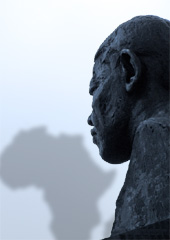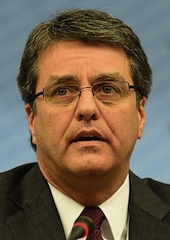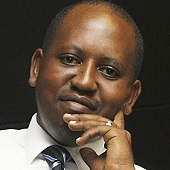Nelson Mandela: Humanity’s Standard-Bearer
For a long time, Mandela’s name was merely worth a whisper. Yet what he stood for now reverberates across the world, loud and clear.
December 16, 2013

Nelson Mandela has left us a legacy that will forever inspire the generations to come.
He embodied all of humanity’s hopes and dreams. He saw what was possible before others could fully comprehend that one day South Africa would take a leap from being a pariah state and become a beacon of hope.
History will remember him as someone who helped South Africa avert a bloodbath that would have laid waste to the beloved country at the foot of the majestic African continent.
For many people, the most indelible memory of Mandela will be his emergence from the Victor Verster prison on February 11, 1990 — after 27 years of imprisonment. That long spell behind bars included 18 years on windswept Robben Island, off the coast of Cape Town.
When news of Mandela’s death broke on Thursday, December 5, 2013, I was in Cape Town. I could not help but wonder what it must have felt like for him and his fellow inmates to have as their home a penal colony a stone’s throw from the most picturesque city in the world.
A force to galvanize the masses
To the uninitiated, that oddity is one of many stark reminders of the brutality that black people faced in South Africa. Before the dawning of a democratic dispensation in 1994, being black was tantamount to a crime. The apartheid regime pulled all sorts of tricks to make that a reality for black people every day, but little did it know that its time was running out.
Growing up I often heard of “Mandela,” but whenever one would ask in-depth questions of who this individual was, few people dared to answer, lest they run afoul of the system.
For a long time, Mandela’s name was merely worth a whisper. Yet what the man stood for now reverberates across the world, loud and clear.
Even those who stood in silence and became complicit in the injustices of the day somehow knew that even a whisper of Mandela’s name carried with it a force so great as to galvanize the masses of the oppressed to fight to dismantle the brutal apartheid system.
The subtext of any of the conversations about Mandela, be it in the townships or elsewhere, among the young and the old, was always a sense of hope, expectation, belief and confidence — that the man behind the name was somebody who knew the course to a future full of promise for all South Africans, black and white.
Among many of Mandela’s core qualities that were so abundantly evident in his lifetime were humility and the ability to unify. Although he once said that nobody should ever think of him as a saint, he understood that people looked up to him to provide moral clarity to bring about justice in South Africa. That clarity underpinned his quest for a country at peace with itself.
In many respects, that quest now falls to all of us to take it forward, imbued with Madiba’s magnanimity.
The restoration of human dignity
Mandela, whose iconic leadership endeared him to people the world over, never had a sense of self-importance about himself. His life fully epitomized what it meant to serve humanity. But his journey was only the beginning.
Today, and in the future, all of us as South Africans must look within ourselves and ask what contribution we all must make to keep his dream alive. After he is laid to rest in his ancestral home of Qunu in the Eastern Cape, we should have a reinvigorated sense of responsibility to unite around the ideals that Mandela stood for.
And those ideals evolved around the restoration of human dignity to all South Africans, because lest we forget, apartheid brutalized even its architects, albeit psychologically. But for black people, the scars were physical, psychological and economic — and still remain. So as a nation, we can either heal these scars or let them turn into open wounds that Mandela fought so tirelessly to soothe.
I do recall that there were days when Mandela’s sure-footed leadership approach was all it took to diffuse disagreements that looked set to derail efforts to bring about a new dispensation and reconciliation.
Today, and in the future, South Africa and the rest of the world will need more leaders of Mandela’s ilk, the kind of leaders who put their cause first and themselves last.
Light into a dark world
In more ways than one, Mandela gave the world a glimpse of what one can achieve when he or she works tirelessly to better the lives of others. Even though he struggled to “retire from retirement” after leaving office, Mandela never shirked from the responsibility to keep making a difference.
He had a knack of putting business leaders — chief executives and anybody with the means to make a real difference — on the spot. For a while after leaving office, Mandela would often emerge here and there, with a business leader on his side who had pledged to either build a school, a clinic or a road.
As a leader, Mandela believed in harnessing the power of the collective to bring about change, and he did that.
But besides having a sense of purpose, Madiba also had a sense of timing. Shaped by circumstance and his heritage, Mandela understood that South Africa could not wait any longer to be free. In one of his speeches, he once offered this wise counsel: “We must use time wisely and forever realize that the time is always ripe to do right.”
That call is to all of us. Let us heed it. To do otherwise will mean that our generation never fully understood or appreciated what Mandela sacrificed.
As we go forward into the future without Mandela, this generation and others to come will do best to internalize that which Mandela stood for. In our own humble way, let us pledge to ask ourselves from now on — “What would Mandela do?” — whenever we face challenges and pitfalls that surely must come our way as we try to consolidate and build upon the foundation that Mandela and his generation laid out for us.
He brought light into a dark world. Let us use it.
Editor’s note: This article first appeared in Business Report, the financial newspaper the author edits in Johannesburg, South Africa, on December 9, 2013. Reprinted with the author’s permission. Copyright Independent Online.
Takeaways
For many, the most indelible memory of Mandela will be his emergence from Verster prison after 27 years of imprisonment.
Before the dawning of a democratic dispensation in 1994, being black in South Africa was tantamount to a crime.
For a long time, Mandela's name was merely worth a whisper. Yet what the man stood for now reverberates across the world.
The subtext of any of conversation about Mandela was always a sense of hope, expectation, belief and confidence.
Read previous

What’s Next for the WTO?
December 16, 2013
